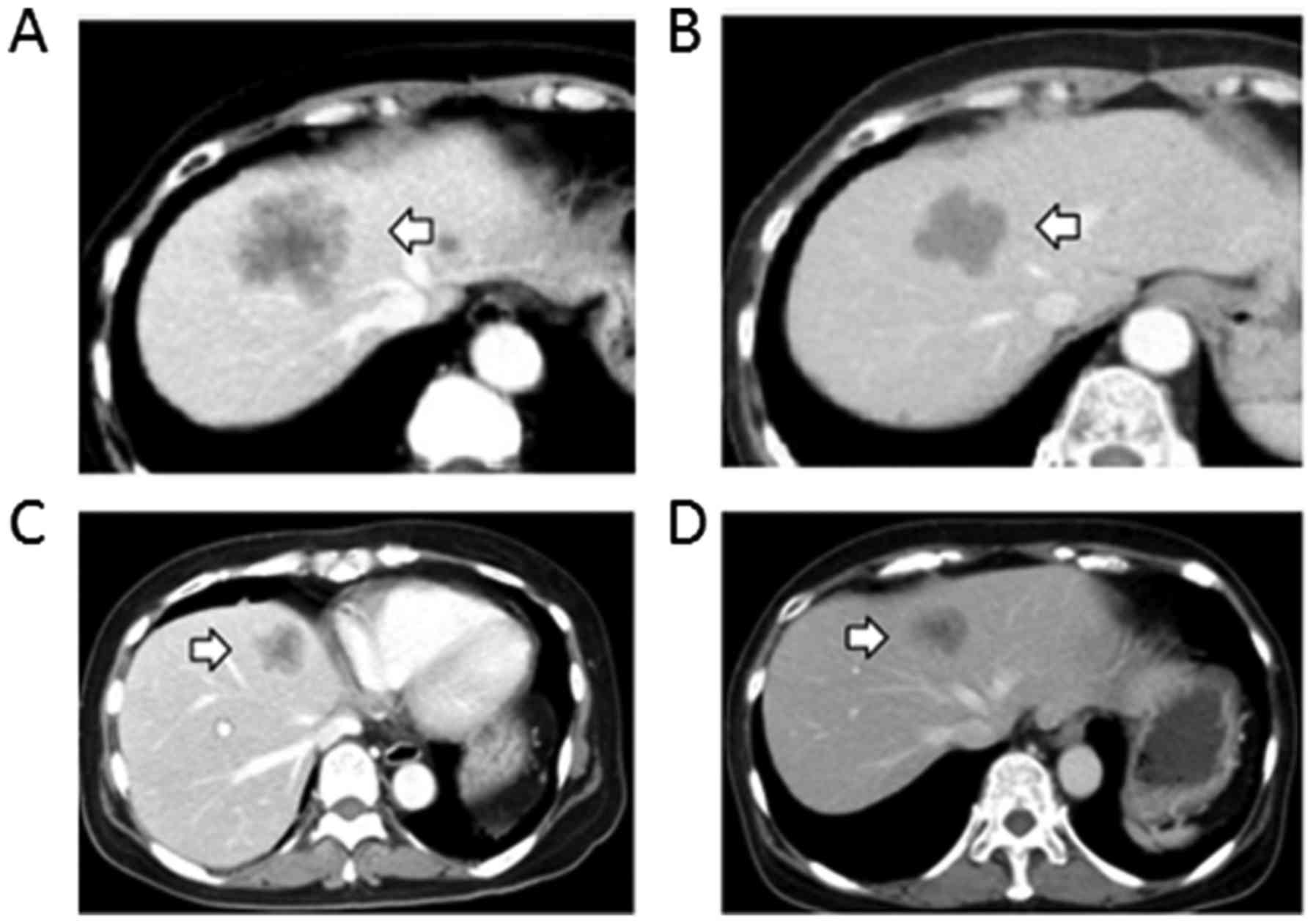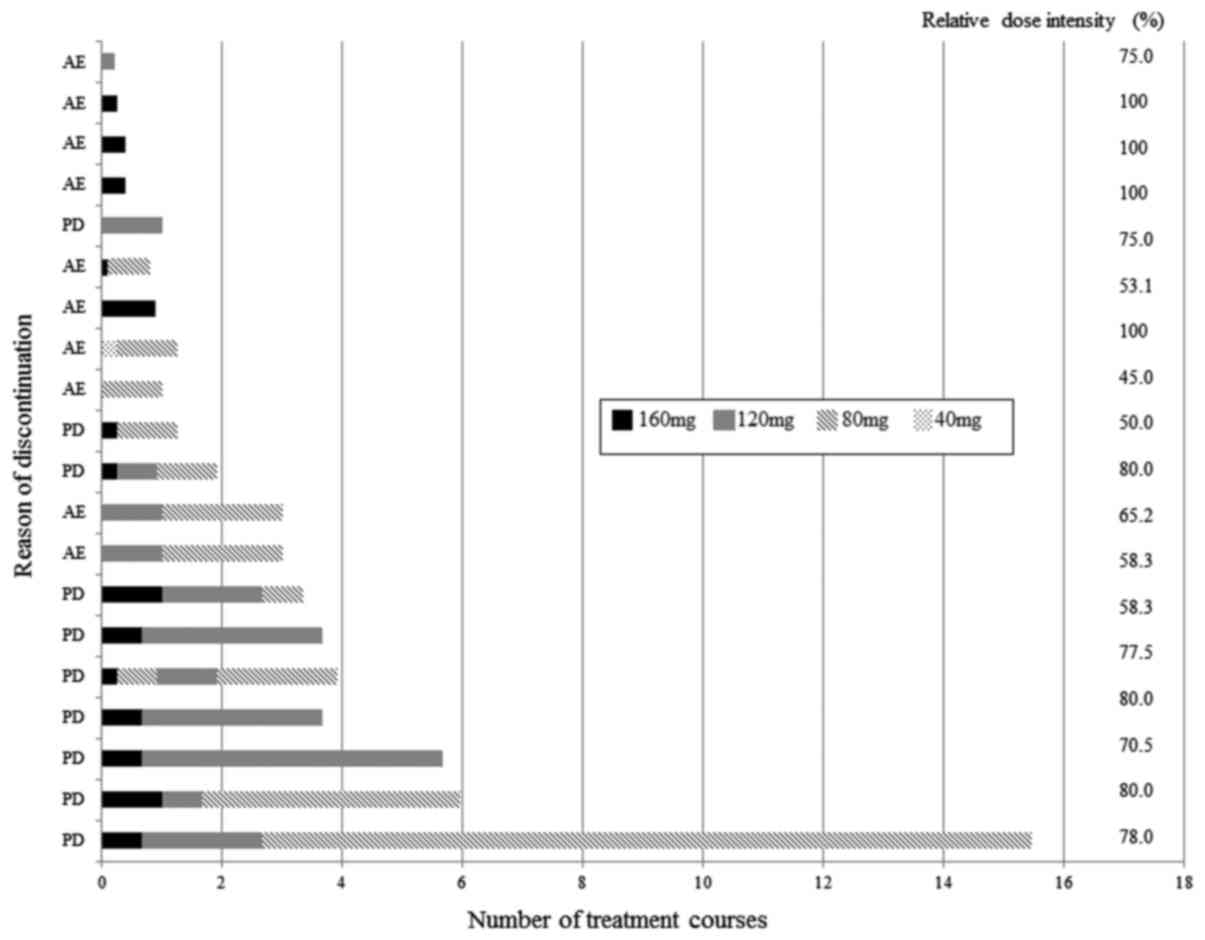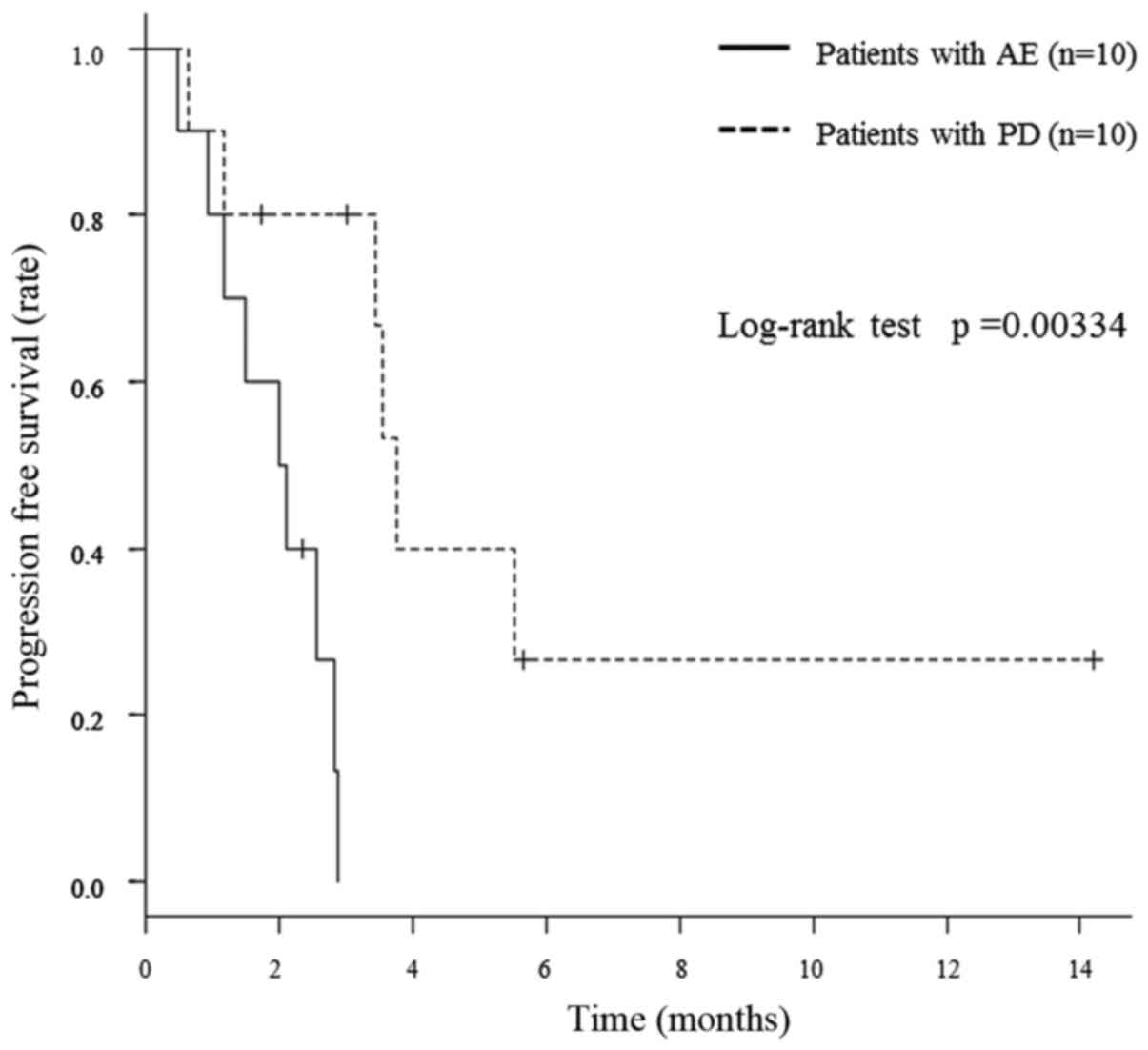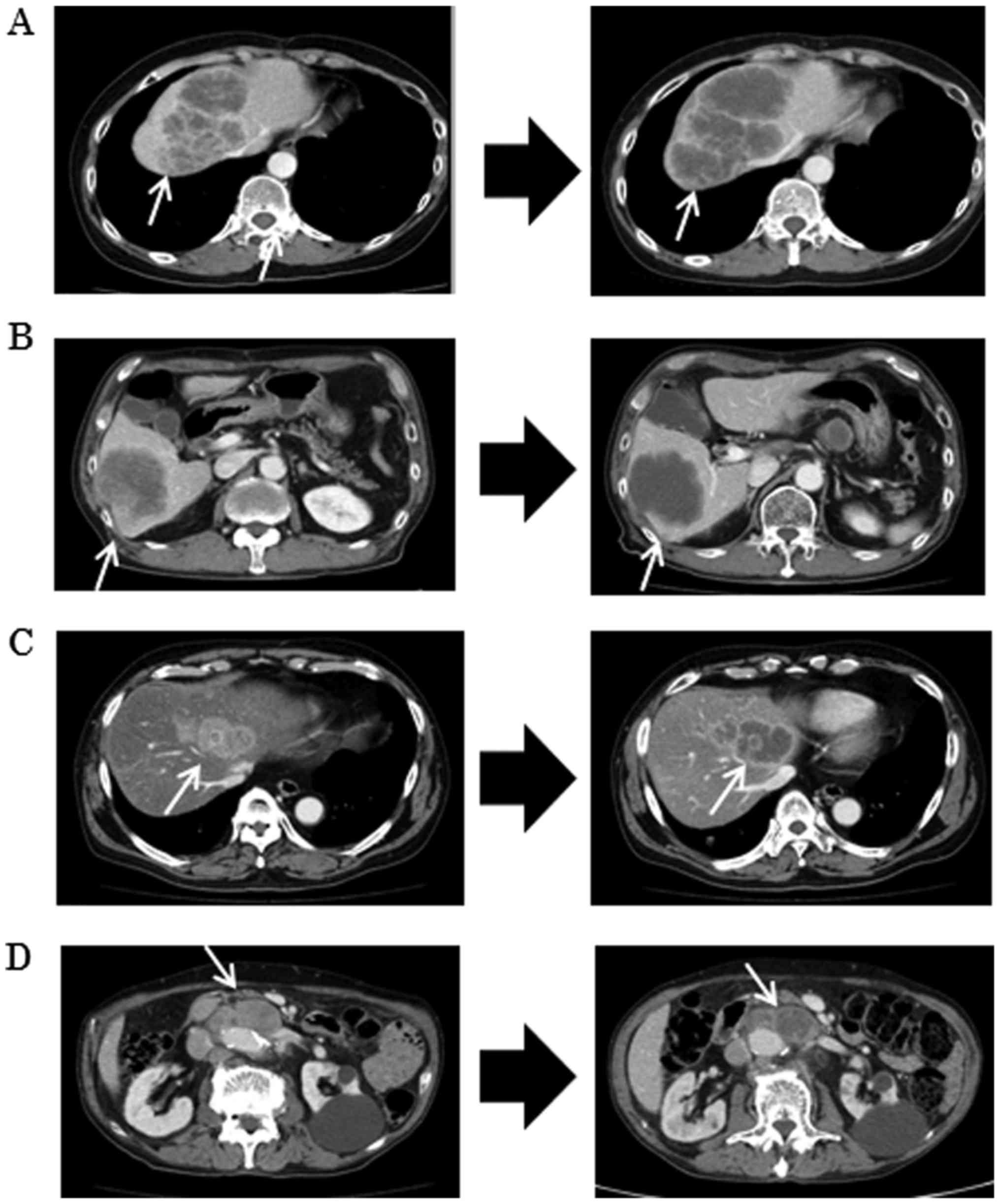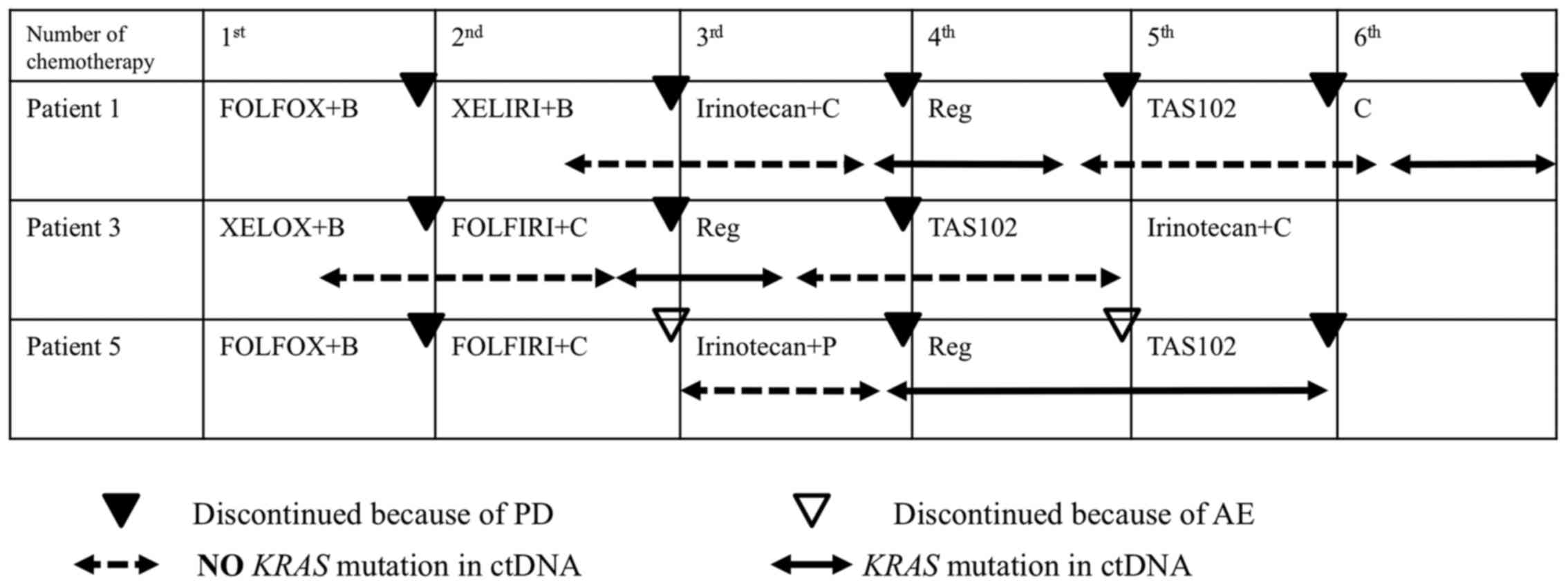|
1
|
Grothey A, Van Cutsem E, Sobrero A, Siena
S, Falcone A, Ychou M, Humblet Y, Bouché O, Mineur L, Barone C, et
al: CORRECT Study Group: Regorafenib monotherapy for previously
treated metastatic colorectal cancer (CORRECT): An international,
multicentre, randomised, placebo-controlled, phase 3 trial. Lancet.
381:303–312. 2013. View Article : Google Scholar : PubMed/NCBI
|
|
2
|
Li J, Qin S, Xu R, Yau TC, Ma B, Pan H, Xu
J, Bai Y, Chi Y, Wang L, et al: CONCUR Investigators: Regorafenib
plus best supportive care versus placebo plus best supportive care
in Asian patients with previously treated metastatic colorectal
cancer (CONCUR): A randomised, double-blind, placebo-controlled,
phase 3 trial. Lancet Oncol. 16:619–629. 2015. View Article : Google Scholar : PubMed/NCBI
|
|
3
|
Demetri GD, Reichardt P, Kang YK, Blay JY,
Rutkowski P, Gelderblom H, Hohenberger P, Leahy M, von Mehren M,
Joensuu H, et al: GRID study investigators: Efficacy and safety of
regorafenib for advanced gastrointestinal stromal tumours after
failure of imatinib and sunitinib (GRID): An international,
multicentre, randomised, placebo-controlled, phase 3 trial. Lancet.
381:295–302. 2013. View Article : Google Scholar : PubMed/NCBI
|
|
4
|
Funakoshi T, Latif A and Galsky MD: Safety
and efficacy of addition of VEGFR and EGFR-family oral
small-molecule tyrosine kinase inhibitors to cytotoxic chemotherapy
in solid cancers: A systematic review and meta-analysis of
randomized controlled trials. Cancer Treat Rev. 40:636–647. 2014.
View Article : Google Scholar : PubMed/NCBI
|
|
5
|
Krishnamoorthy SK, Relias V, Sebastian S,
Jayaraman V and Saif MW: Management of regorafenib-related
toxicities: A review. Therap Adv Gastroenterol. 8:285–297. 2015.
View Article : Google Scholar : PubMed/NCBI
|
|
6
|
McLellan B, Ciardiello F, Lacouture ME,
Segaert S and Van Cutsem E: Regorafenib-associated hand-foot skin
reaction: practical advice on diagnosis, prevention, and
management. Ann Oncol. 26:2017–2026. 2015. View Article : Google Scholar : PubMed/NCBI
|
|
7
|
Chun YS, Vauthey JN, Boonsirikamchai P,
Maru DM, Kopetz S, Palavecino M, Curley SA, Abdalla EK, Kaur H,
Charnsangavej C, et al: Association of computed tomography
morphologic criteria with pathologic response and survival in
patients treated with bevacizumab for colorectal liver metastases.
JAMA. 302:2338–2344. 2009. View Article : Google Scholar : PubMed/NCBI
|
|
8
|
Maheswaran S, Sequist LV, Nagrath S, Ulkus
L, Brannigan B, Collura CV, Inserra E, Diederichs S, Iafrate AJ,
Bell DW, et al: Detection of mutations in EGFR in circulating
lung-cancer cells. N Engl J Med. 359:366–377. 2008. View Article : Google Scholar : PubMed/NCBI
|
|
9
|
Diaz LA Jr, Williams RT, Wu J, Kinde I,
Hecht JR, Berlin J, Allen B, Bozic I, Reiter JG, Nowak MA, et al:
The molecular evolution of acquired resistance to targeted EGFR
blockade in colorectal cancers. Nature. 486:537–540.
2012.PubMed/NCBI
|
|
10
|
Misale S, Yaeger R, Hobor S, Scala E,
Janakiraman M, Liska D, Valtorta E, Schiavo R, Buscarino M,
Siravegna G, et al: Emergence of KRAS mutations and acquired
resistance to anti-EGFR therapy in colorectal cancer. Nature.
486:532–536. 2012.PubMed/NCBI
|
|
11
|
Siravegna G, Mussolin B, Buscarino M,
Corti G, Cassingena A, Crisafulli G, Ponzetti A, Cremolini C, Amatu
A, Lauricella C, et al: Clonal evolution and resistance to EGFR
blockade in the blood of colorectal cancer patients. Nat Med.
21:795–801. 2015. View Article : Google Scholar : PubMed/NCBI
|
|
12
|
Tabchi S and Ghosn M: Regorafenib: Start
low and go slow. Target Oncol. 10:445–447. 2015. View Article : Google Scholar : PubMed/NCBI
|
|
13
|
Klinger M, Tamandl D, Eipeldauer S, Hacker
S, Herberger B, Kaczirek K, Dorfmeister M and Gruenberger BT:
Bevacizumab improves pathological response of colorectal cancer
liver metastases treated with XELOX/FOLFOX. Ann Surg Oncol.
17:2059–2065. 2010. View Article : Google Scholar : PubMed/NCBI
|
|
14
|
OConnor JP, Carano RA, Clamp AR, Ross J,
Ho CC, Jackson A, Parker GJ, Rose CJ, Peale FV, Friesenhahn M, et
al: Quantifying antivascular effects of monoclonal antibodies to
vascular endothelial growth factor: insights from imaging. Clin
Cancer Res. 15:6674–6682. 2009. View Article : Google Scholar : PubMed/NCBI
|
|
15
|
Suzuki K, Muto Y, Ichida K, Fukui T,
Takayama Y, Kakizawa N, Kato T, Hasegawa F, Watanabe F, Kaneda Y,
et al: Morphologic response contributes to patient selection for
rescue liver resection of chemotherapy patients with initially
unresectable colorectal liver metastasis. Oncol Lett. (In
press).
|
|
16
|
Mross K, Frost A, Steinbild S, Hedbom S,
Buchert M, Fasol U, Unger C, Kratzschmar J, Heinig R, Boix O, et
al: A phase I dose-escalation study of regorafenib (BAY 73–4506),
an inhibitor of oncogenic, angiogenic, and stromal kinases, in
patients with advanced solid tumors. Clin Cancer Res. 18:2658–2667.
2012. View Article : Google Scholar : PubMed/NCBI
|
|
17
|
Nielsen DL, Palshof JA, Larsen FO, Jensen
BV and Pfeiffer P: A systematic review of salvage therapy to
patients with metastatic colorectal cancer previously treated with
fluorouracil, oxaliplatin and irinotecan +/− targeted therapy.
Cancer Treat Rev. 40:701–715. 2014. View Article : Google Scholar : PubMed/NCBI
|















